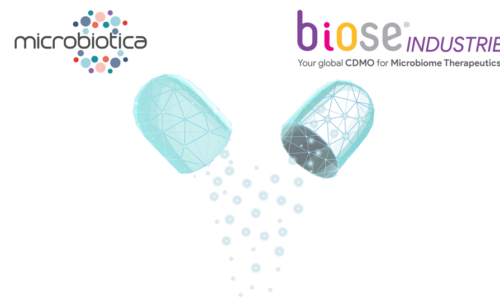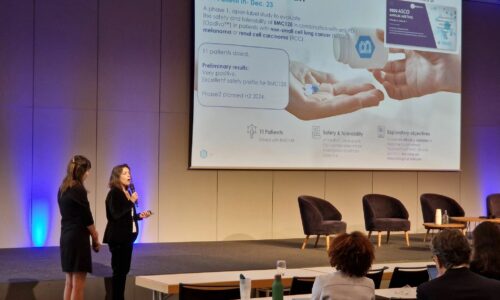Review by Claire Derlot
Head of Programs for LBP Development & Manufacturing

A few weeks back, Nadine, Richard, Adrien, and I had the pleasure of attending the Boston-based microbiome drug development conference “Microbiome Connect USA 2024”. Spanning 3 days the event promised the chance to connect with the microbiome field, and learn about its latest innovations, and it did not disappoint!
Women’s & Infant Microbiome Pre-day
Arriving at the conference, November 14th, we attended the Women’s & Infant microbiome pre-day, a day of talks and panels dedicated to the work being undertaken to improve women’s health treatments and outcomes for infants. The talks ranged from regulatory considerations for microbiome-based technologies in paediatric use from the FDA to discussions on single-strain vs multi-strain approaches for vaginal dysbiosis.
Caroline Mitchell’s presentation was a personal highlight of the pre-day, providing a detailed analysis of microbiome interventions for bacterial vaginosis (BV). Mitchell described the lack of efficacy and innovation for existing bacterial vaginosis treatments, pointing out that options have remained stagnant since the 1980s, with antibiotics being the main treatment. Antibiotic usage leads to high rates of BV recurrence and rarely restores the vaginal microbiota to a healthy L. Crispatus dominance, Mitchell explained. The presentation explored a range of research projects which are developing antibiotic, microbiome-modulating alternatives, mentioning work by her eponymous lab as well as the Kwon Lab, Freya Biosciences, and the VMRC. It was exciting to see Biose’s partnership with the VMRC to develop an L. Crispatus derived LBP for BV be mentioned. The LBP is currently being tested for safety and efficacy in a phase 1 trial with results expected in 2025.
Day One – A Post Regulatory Approval Microbiome Market
On the morning of Day 1, we entered the buzzing conference room where Vedanta kicked off the official day one with a presentation on the future of the microbiome drug landscape. Dan Couto, Vedanta’s Chief Operating Officer, explored the field’s recent events including the closure of several developers, significant investments, and M&As. This led nicely into a panel discussion with MTIG, Rebiotix, BiomeBank, and Seres Therapeutics who discussed the field’s future in the context of the recent regulatory approvals.
Following the morning session, the agenda split into two tracks: “Emerging Pipeline & Therapeutic Updates” and “Bioprocessing & Data Strategies”. Emerging Pipeline & Therapeutics Updates covered a range of modalities for targeting a range of microbiomes, including a multi-strain product for targeting the lung microbiome from Biose partner Alveolus to a small molecule regulator of the gut microbiome by Axial Therapeutics. On the other track, Bioprocessing & Data Strategies presentations focused on the manufacturing side of microbiome drug development exploring CMC and cGMP manufacturing considerations and challenges, including one I was privileged to give on Biose’s world leading expertise in drug manufacturing.
My presentation described our global customer base, and how we leverage EU and US based facilities to ensure a close working relationship with our clients. I explained our end-to-end services, which extend from WGS data analysis for strain identification to regulatory support for CTD filing. A key focus of the talk was a scale-up case study on one of our clients. This project begun at our technology transfer facility in Boston. Where we worked to scale an extremely oxygen sensitive microbe from our clients’ flask-scale up to a 2000L reactor. This journey took several iterations, working up increasing scale and regulating the process until the microbe grew reliably and robustly. This kind of speciality work is only possible due to our extensive experience working with microbes, beginning in 1951!
The day ended with a screening of “Designer Shit”, followed by a panel discussion of the film. The movie followed the journey of Director Saffron Cassady, as she examined the world of faecal microbiome transplantation as a potential treatment for Ulcerative Colitis.
Day Two – Money, Microbiome and Manufacturing
At a time of uncertain investment for the biotech field at large, the morning panel of day two felt appropriate, focusing on what biotechs can do to engage investors and ensure their financial future in the market. Joyance Partners, Seventure, and Corundum Systems Biology all gave their input on this question giving a rounded view of investment strategy to the room full of microbiome researchers.
Once again, the program split into the two tracks, with Emerging Pipelines and Therapeutics continuing to showcase the diverse modalities biotechs are using to improve health outcomes, this time broadening to include clinical reads-outs for indications including rare liver disease, eczema, and cancer. Bioprocessing & Data Strategies shifted its focus to cover the “data” side of the track, with talks on multi-omics, proteomics, and biomarker development.
After three days of meeting with existing and new clients, listening to leading researchers discuss their work, the event came to a close. We all had a wonderful experience at Microbiome Connect and we cannot wait to return next year.
Presentation highlights:
Presentations we particularly enjoyed included:
- “Ambition to Provide Premature Infants With Approved Medication” – Robert Molander, COO, Infant Bacterial Therapeutics. Molander opened by describing the market opportunity for an effective infant necrotising enterocolitis (NEC) treatment, highlighting the high economic burden of the disease along with the high frequency. Their phase 3 candidate IB-9414 leverages reuteri to reduce inflammation and prevent dysbiosis in premature infants to prevent NEC development. Their phase 3 is currently the largest preterm randomised trial to date, IBT expect results for IB-9414 in 2024.
- “Development of AX -5006, a Small Molecule Inhibitor of CsgA Aggregation as a Potential Disease -Modifying Treatment for Parkinson’s Disease” – Becca Senter, Ph.D, Vice President, Head of Preclinical Research and Development, Axial therapeutics – Senter discussed Axial’s work on gut-brain candidates including small molecules to target autism-associated irritability, parkinson’s disease, and oncology. The presentation focused mostly on their lead candidate, AX-5006. Senter presented compelling results from Axial’s preclinical work which indicated that AX-5006 inhibits CsgA aggregation in mice models to alleviate Parkison’s motor-related symptoms. AX-5006 plans to enter the clinic in 2024.
- “AI-enabled, Metabolomics-based Drug Discovery Engine for Inflammatory Disease” – Hannah Wastyk, CEO, Interface Biosciences – Wastyk introduced Interface’s platform of AI-powered drug discovery, which combines the cultivation of important microbes in a proprietary growth media with an AI tool “CausalVision” to screen for microbe-produced metabolites with casual relationship to disease phenotypes. Interface’s first candidate is a topical Rx small peptide, RC13, which targets atopic dermatitis. Wastyk presented pre-clinical results which showed improved wound-healing in a scratch model and in vivo antibiotic activity.
- “Reinventing Humanity’s Relationship with Microbes” – Cheri Ackerman, CEO, Concerto Biosciences. Ackerman opened with a description of Concerto’s kChip technology, a high-throughput discovery platform for measuring microbe-microbe interactions. Ackerman explained the application of the kChip to discover a new candidate, ENS-003, to target vulvovaginal candidiasis. The LBP will modulate albicans, by down-regulating it’s virulence and shifting it to a commensal state. Concerto are currently screening the top performing bacterial combinations which regulate C. albicans.
Preclinical showcase presentation – Dr. Egle Katkeviciute, CSO and co-founder, Recolony – Katkeviciute presented their work to develop two anti-cancer candidates. The first is an LBP, RCLBP01, based on commensal bacteria which modulates T-cell activity to aid tumour clearance. Due to the approach only using commensal bacteria the therapeutic has high tolerability compared to other anti-cancer approaches. The company will be filing for an IND in 2025. Along with this LBP approach, Recolony are also developing a small molecule based on a RCLBP01-produced metabolite. Recolony forecast filing an IND for their small molecule late 2026.



